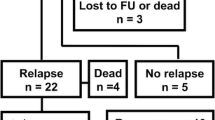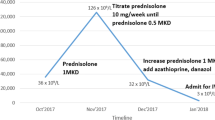Abstract
Chronic lymphocytic leukemia (CLL) can trigger autoimmune phenomena, with immune thrombocytopenia (ITP) the most common presentation. Upon cessation of CLL therapy, including ibrutinib, autoimmune flares can occur. In a 68-year-old man with CLL, ibrutinib was held for 2 weeks prior to elective shoulder surgery. Eleven days after stopping therapy, he presented with a purpuric rash on his right hip, buttock, and lower extremities. He experienced two episodes of seizure activity while hospitalized. MRI brain demonstrated patchy areas of altered signal involving deep white matter and sub-cortical white matter structures concerning for cerebral vasculitis. Although there was no evidence of hemolysis, serum cold agglutinin titer was elevated at > 1:512 and cryoglobulin levels were positive at 36%. He was diagnosed with type I cryoglobulinemia and treated with rituximab, plasmapheresis, methylprednisolone, and ibrutinib was restarted. This regimen resolved his symptoms. A rare complication of CLL is the production of cryoglobulins, which can present at initial diagnosis or in relapsed disease. Our case demonstrates that the cessation of ibrutinib therapy, even for a short time, can precipitate complications. To our knowledge, we report the first case of a patient with well-controlled CLL who rapidly developed cryoglobulinemic vasculitis after stopping ibrutinib therapy.



Similar content being viewed by others
References
Jemal A, Siegal R, Xu J, Ward E. Cancer Statistics, 2010. CA Cancer J Clin. 2010;60(5):277–300.
Zent CS, Kay NE. Autoimmune complications in chronic lymphocytic leukaemia (CLL). Best Pract Res Clin Haematol. 2010;23(1):47–59.
Ruzickova S, Pruss A, Odendahl M, Wolbart K, Burmester GR, Scholze J, et al. Chronic lymphocytic leukemia preceded by cold agglutinin disease: intraclonal immunoglobulin light-chain diversity in V(H)4-34 expressing single leukemic B cells. Blood. 2002;100(9):3419–22.
Berentsen S, Bø K, Shammas FV, Myking AO, Ulvestad E. Chronic cold agglutinin disease of the “idiopathic” type is a premalignant or low-grade malignant lymphoproliferative disease. APMIS. 1997;105(5):354–62.
Burger JA, Tedeschi A, Barr PM, Robak T, Owen C, Ghia P, et al. Ibrutinib as initial therapy for patients with chronic lymphocytic leukemia. N Engl J Med. 2015;373(25):2425–37.
Lewis FB, Schwartz RS, Dameshek W. X-radiation and alkylating agents as possible “trigger” mechanisms in the autoimmune complications of malignant lymphophroliferative disease. Clin Exp Immunol. 1966;1(1):3–11.
Barcellini W, Capalbo S, Agostinelli RM, Mauro FR, Ambrosetti A, Calori R, et al. Relationship between autoimmune phenomena and disease stage and therapy in B-cell chronic lymphocytic leukemia. Haematologica. 2006;91(12):1689–92.
Rogers KA, Ruppert AS, Bingman A, Andritsos LA, Awan FT, Blum KA, et al. Incidence and description of autoimmune cytopenias during treatment with ibrutinib for chronic lymphocytic leukemia. Leukemia. 2016;30(2):346–50.
Sato R, Jacob J, Gaballa S. Rapid flare of immune thrombocytopenia after stopping ibrutinib in a patient with chronic lymphocytic leukemia. Leuk Lymphoma. 2017;59(7):1–4.
Brouet J-C, Clauvel J-P, Danon F, Klein M, Seligmann M. Biologic and clinical significance of cryoglobulins: a report of 86 cases. Am J Med. 1974;57(5):775–88.
Meltzer M, Franklin EC. Cryoglobulinemia—a study of twenty-nine patients. Am J Med. 1966;40(6):828–36.
Morra E. Cryoglobulinemia. Hematol Am Soc Hematol Educ Progr 2005;1(1):368–72.
Xu W, Wang Y-H, Fan L, Fang C, Zhu DX, Wang DM, et al. Prognostic significance of serum immunoglobulin paraprotein in patients with chronic lymphocytic leukemia. Leuk Res. 2011;35(8):1060–5.
Michael AB, Lawes M, Kamalarajan M, Huissoon A, Pratt G. Cryoglobulinaemia as an acute presentation of waldenstrom’s macroglobulinaemia. Br J Haematol. 2004;124(5):565.
Payet J, Livartowski J, Kavian N, Chandesris O, Dupin N, Wallet N, et al. Type I cryoglobulinemia in multiple myeloma, a rare entity: analysis of clinical and biological characteristics of seven cases and review of the literature. Leuk Lymphoma. 2013;54(4):767–77.
Néel A, Perrin F, Decaux O, Dejoie T, Tessoulin B, Halliez M, et al. Long-term outcome of monoclonal (type 1) cryoglobulinemia. Am J Hematol. 2014;89(2):156–61.
Brouet JC, Clauvel JP, Danon F, Klein M, Seligmann M. Biologic and clinical significance of cryoglobulins. A report of 86 cases. Am J Med. 1974;57(5):775–88.
Terrier B, Karras A, Kahn J-E, Guenno GL, Marie I, Benarous L, et al. The spectrum of type I cryoglobulinemia vasculitis: new insights based on 64 cases. Medicine (Baltimore). 2013;92(2):61–8.
Terrier B, Cacoub P. Cryoglobulinemia vasculitis: an update. Curr Opin Rheumatol. 2013;25(1):10–8.
Dearden C. Disease-specific complications of chronic lymphocytic leukemia. Hematology. 2008;2008(1):450–6.
Byrd JC, Furman RR, Coutre SE, Flinn IW, Burger JA, Blum KA, et al. Targeting BTK with ibrutinib in relapsed chronic lymphocytic leukemia. N Engl J Med. 2013;369(1):32–42.
O’Brien S, Jones JA, Coutre SE, Mato AR, Hillman P, Tam C, et al. Ibrutinib for patients with relapsed or refractory chronic lymphocytic leukaemia with 17p deletion (RESONATE-17): a phase 2, open-label, multicentre study. Lancet Oncol. 2016;17(10):1409–18.
Montillo M, O’Brien S, Tedeschi A, Byrd JC, Dearden C, Gill D, et al. Ibrutinib in previously treated chronic lymphocytic leukemia patients with autoimmune cytopenias in the RESONATE study. Blood Cancer J. 2017;7(2):e524.
Manda S, Dunbar N, Marx-Wood CR, Danilov AV. Ibrutinib is an effective treatment of autoimmune haemolytic anaemia in chronic lymphocytic leukaemia. Br J Haematol. 2015;170(5):734–6.
Author information
Authors and Affiliations
Corresponding author
Ethics declarations
Conflict of interests
The authors have no conflicts of interest to report.
Additional information
Publisher's Note
Springer Nature remains neutral with regard to jurisdictional claims in published maps and institutional affiliations.
About this article
Cite this article
Wright, N., Voshtina, E., George, G. et al. Cryoglobulinemic vasculitis with interruption of ibrutinib therapy for chronic lymphocytic leukemia (CLL). Int J Hematol 110, 751–755 (2019). https://doi.org/10.1007/s12185-019-02729-4
Received:
Revised:
Accepted:
Published:
Issue Date:
DOI: https://doi.org/10.1007/s12185-019-02729-4




